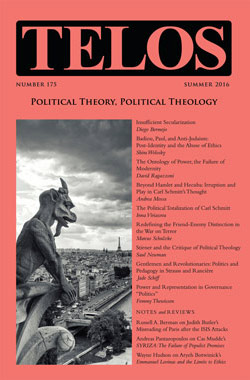The process of secularization is insufficient if, voided of its original pathos, it leads to any form of sacralization of the immanence. Secularism becomes insufficient, if not harmful, in the same way as religious fundamentalism, if it becomes an obstacle to building pluralistic coexistence. Therefore, secularism should acknowledge the emergence of religious challenges. Religion has found, in the crisis of reason (metaphysical, scientific, and political), an opportunity not only to be present in the public sphere, but also to demand the right to equal treatment—appealing to the same democratic principles of secularism—and the right to political participation. Secularism cannot respond to these challenges with another form of “enlightened fundamentalism.”
|
While “the political” is among the most studied aspects of Carl Schmitt’s thought, little attention has been paid to the notion of “the unpolitical,” which, I argue, plays a crucial role in understanding the totalizing status of the political. This essay, first, illuminates the symptomology of Schmitt’s political totalization; it shows how, despite its claim to autonomy, the political emerges as the total: an infinite potential that consumes human life as a whole. Second, this essay argues that the institution of political totality essentially relies upon the elimination of its radical outside—the “absolutely unpolitical.” Throughout his writings Schmitt presents the unpolitical as a merely “fictitious” reality. Meanwhile, what remains obscured is an originary event, the decision on the absolutely unpolitical, which institutes a pre-political field and thus grounds any subsequent political decision. When Carl Schmitt declared in Politische Theologie (1922) that “All significant concepts of the modern theory of the state are secularized theological concepts,” one could be forgiven for thinking he was directly invoking Max Stirner, who, in Der Einzige und sein Eigenthum (1845), launched a devastating assault on the religious categories that haunted modern thought and politics. While Schmitt and Stirner are approaching the question from opposed perspectives, they are nevertheless engaged in an investigation of the relationship between theology and politics. This article shows how Stirner’s unmasking of the Christianizing impulse behind modern secular humanism—particularly that of Ludwig Feuerbach—and his critique of liberalism, leads us to a radically atheistic politics in which the sovereignty of the state and its accompanying figure of the liberal individual, are deconstructed. Central here is the notion of the insurrection as a revolt against “fixed ideas” and their hold over us. Through his figures of the unique one, ownness, and insurrection, Stirner provides us with an alternative, non-theological language for subjectivity and politics that avoids the chain of substitutions underpinning the theological drive of modern secularism. Those who read Hamlet or Hecuba from the specialist’s standpoint have often found it naïve, and maybe with good reason. Yet I do not want to linger on its worth or faults as a critical essay; I would rather try to read Schmitt’s book in the same way that he read Hamlet, as an eccentric writing, not completely closed, that deals with a subject matter but revolves around another one: Hamlet or Hecuba is something more than a piece of literary criticism. Paul has emerged as central to some of the most prominent European intellectuals today, notably Alain Badiou in Saint Paul: The Foundation of Universalism. On the one hand, Badiou claims his philosophy to be a post-metaphysics in accord with postmodern critiques of traditional ontologies. He thus empties Paul of either historical or supernatural content. And yet, Badiou reconstructs what amounts to a secular political theology that strikingly reproduces the dogmatism of metaphysics. As his title announces, Badiou resurrects Paul in the name of universalism. Universalism claims to be, and indeed often is, an attempt to safeguard and respect everyone equally. But in Badiou universalism restages the erasure of difference and multiplicity in human experience that launched metaphysical critique in the first place. As secular venture what he ironically demonstrates is how tenacious traditional metaphysical unity remains even in apparently post-theological discourses. |
||||
|
Telos Press Publishing · PO Box 811 · Candor, NY 13743 · Phone: 212-228-6479 Privacy Policy · Data Protection Copyright © 2024 Telos Press Publishing · All Rights Reserved |
||||








